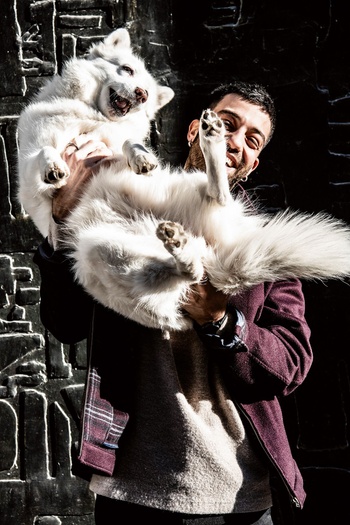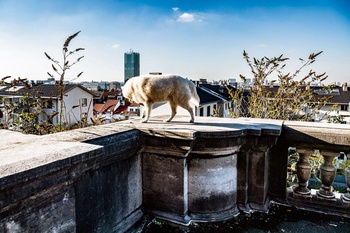Five years ago the Brussels-based composer, musician, and sound designer Bassel Abou Fakher fled from Syria to Belgium. But in the children’s book Saving Stella, which is now being released by a prestigious American publishing house, his dog takes centre stage. Stella followed her owner on his perilous journey out of the war zone.
© Saskia Vanderstichele
Bassel Abou Fakher is doing well. The trained cellist, who after fleeing from Syria and being recognized in Belgium made a name for himself with the Qotob Trio, has stopped performing live onstage, but he now works as a composer of music for films and commercials, a sound engineer, and producer. He has collaborated with the American-Brussels composer and sound engineer Adam Wiltzie, the top Belgian musician, composer, and conductor Michel Bisceglia, and contributed to the music for the Swiss TV series Double vie, starring the Brussels actor Yoann Blanc in one of the lead roles.
And now there is also an American children’s book in which Abou Fakher himself plays an important role, but of which the real star is his big white dog Stella. Stella is the Canadian shepherd that you might see Abou Fakher walking in the neighbourhood where he lives in Sint-Gillis/Saint-Gilles. While he, after fleeing across the Mediterranean Sea in a rickety boat, spent a year waiting for his papers in the hospitable family of his friend Joannes in Brussels, he hatched the complex, risky, and also somewhat unusual plan to bring his dog, which had stayed behind in Syria, to Belgium. This is the story that is told in the brand-new illustrated children’s book Saving Stella.

© Saskia Vanderstichele
“I got Stella in Syria when I was fourteen, and she was about one month old,” Abou Fakher remembers. “Five years later, my mother, sister, and I all fled to different countries (Bassel’s mother now lives in Ireland and his sister lives in Germany, ed.) and we thus live separated from one another. My father could not leave Syria because he had to take care of my grandmother for as long as she was still alive. So he stayed behind with Stella, but it was quite difficult for him because in addition to my grandmother he also had to take care of himself. After I had lived with Joannes’s family for a few months, I told them about Stella. I do not remember precisely who, but someone said: she’s a big dog, but let’s try to bring her over anyway.”
Could you have given Stella to somebody else in Syria?
Bassel Abou Fakher: Perhaps, but I never considered it, even though bringing her here was very challenging. Not only for me, but also for Joannes, who went to pick her up in Beirut, Lebanon, for Fares, who helped him there, and for my father, who had to find the taxi driver Rasheed, who drove Stella from Damascus in Syria to Beirut.
What were the most perilous moments during the whole undertaking?
Abou Fakher: The Lebanese authorities are very strict with Syrians. Lebanon is a small country that has many problems of its own, and 1.5 million Syrian refugees have been added to the population of 4.5 million people. That is no excuse to treat Syrians badly, but it is perhaps a reason to be on their guard. There are many checkpoints, so when Joannes and Fares were in the car with the dog and told their story at the checkpoints, of course they were not believed. “Are you seriously expecting us to believe that this Belgian is here to pick up a Syrian dog for a Syrian refugee in Belgium?!”
Fares also waited at the airport in Beirut until Joannes sent him a text message saying that both he and Stella were on the aeroplane. During those two hours, Fares as a Syrian was checked again and ultimately, he had to spend a night in gaol and pay a fine because they thought his story was suspicious.
The first time I held the book in my hands, it moved me and it was almost like experiencing it all again physically
Stella had to travel separately from Joannes in the hold of the plane.
Abou Fakher: And without tranquilizers because she had vomited them out due to the stress. Once she was in Belgium, Stella had several other stress attacks when she saw soldiers in camouflage clothing.
In a Hollywood movie, Stella would have come dashing towards you at the airport in Zaventem to jump into your arms, but in reality and in the book, that is not what happened.
Abou Fakher: No. She did recognize me, but she was very stressed and distant. The travel cage was new to her, it was cold on the flight, and she had also had a layover in Turkey. It took her a while to recover. But Stella has been my constant compan- ion ever since. I always try to take her with me when I visit friends or go to work.
Stella is a living creature like us, but there must have been moments when you wondered why you were taking so many risks.
Abou Fakher: Of course. But I felt a little like you would probably feel about a child. When we first got Stella in Syria, there was no war, and nobody could have predicted how much the situation would change. I was eighteen when I fled. Neither my mother nor my sister could take Stella. Thanks to luck and hard work, I was doing better than them at some point, so I thought it was the only solution and my responsibility.
The story in the book seems remarkably faithful. It has not been romanticized or made more spectac- ular than it was. Even the names of the characters are all just your real names.
Abou Fakher: To be completely clear: I didn’t write the story myself. They are not my words, but those of Deborah Blumenthal. She is an award-winning New York-based author, including of children’s books, and she wrote the story based on conversa- tions that we had. I didn’t want to lie, and certainly not to children. So what you read in the book is the true story. Deborah just adapted it so that it would be appropriate and readable for children.
And ultimately, that worked really well. It is of course difficult to congratulate yourself, but the first time I held the book in my hands, it moved me and it was almost like experiencing it all again physically. I think the story’s power lies in its simplicity. It means children can use their imaginations to fill in a lot of details.

© Saskia Vanderstichele
Where did the idea for this American children’s book come from?
Abou Fakher: It all started with an interview in Woef (a Belgian dog magazine, ed.), in which I had told Stella’s story. That article had apparently been sold to a German and then a New York-based dog magazine. I didn’t know anything about that. I got a message from a German friend at one point, telling me that I was in a German magazine. (Laughs)
Deborah contacted me because of that article. She had already worked with Bloomsbury Publishing – a big publishing house that published the Harry Potter series but is also known for academic books. That looked interesting, and so we started preparing her script. Apart from a few details, I thought her first version was very good. The publisher wanted a Syrian illustrator to be involved, and that is how Nadine Kaadan joined the project. Her illustrations also have a big impact, of course. The way she drew Damascus or my journey is accurate to a certain extent, but is also the result of her artistic vision. I love the way she did it, and of course I had no involvement in that.
Do you think that there is a more broad-ranging story here for adults or young adults?
Abou Fakher: I have wondered about that idea, and that might be something to explore in the future. I am interested in explaining other elements that people probably don’t know about because they don’t know anyone who can tell them. For example, some people might wonder who captained the rubber dinghy in which I crossed the Mediterrane- an Sea. The captains are not people traffickers because they would never risk it themselves. They are refugees who pay the traffickers less money because the lives of the passengers are in their hands, and because they are considered traffickers if they are intercepted by the authorities. That is an example of a detail that is hidden in the general story and which of course is not appropriate in a children’s book.
It is well-known, but also rather grim, that some people have more sympathy for a cute dog than for people who are fleeing for their lives. Is this an appropriate way to teach children something about issues around refugees?
Abou Fakher: Yes, this is an important theme for children too, and I think a “heroic” story like this is a good and simple way to introduce them to the issue. The refugee crisis is not simply going to disappear. The traces of large-scale immigration remain visible and affect society for decades afterwards.
Over the past few years, you sought and found a new life and recognition through your music. Nevertheless, you want to keep telling the story of your flight. Perhaps even at schools?
Abou Fakher: I am conscious of the fact that I will be associated with this story for a while. (Laughs) But I am very happy to tell it to children. Because people, including myself, are often dissatisfied with what they have, but also want what other people have. When I was eighteen, I got into that rubber dinghy as I fled to Europe. That is an age at which other children are normally thinking about other things. If you can tell children what I was facing at the beginning of the civil war, they might become more aware of the fact that we have a lot to be grateful for here.
Read more about: Expo , Saving Stella
Fijn dat je wil reageren. Wie reageert, gaat akkoord met onze huisregels. Hoe reageren via Disqus? Een woordje uitleg.